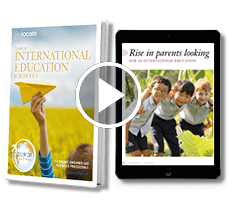How to choose a new school
Relocating with school-age children is one of the biggest challenges a family can face. To help the process go smoothly, our step-by-step guide to choosing a school suggests questions to ask on a school visit and provides advice from schools themselves.
Do your research
First things first: parents need to roll up their sleeves and get down to some serious research. Casting the net wide to start with can help families to understand what they really want from a home and school, and what they would be prepared to compromise on.“Parents should make sure they look for a school before they decide where to live,” advises Kim Burgess, external relations director at the British School of Brussels. Often, homes in the areas surrounding good schools – regardless of whether they are fee-paying or state-funded – come with a hefty price tag, so it’s vital that families are realistic about what they can afford.Oversubscribed state schools in England will require families to live in their catchment area if they are to stand a chance of being offered a place. It’s important, therefore, to ensure that your chosen home is both affordable and falls within the designated area of your chosen school. Likewise, deciding between state schools, independent fee-paying schools and an international school will depend on budget, as well as on other considerations, such as the length of the assignment and the standard of education available in the area.“Even at the start of a new international posting, parents need to consider how long they plan to stay and what their future plans are,” says Joanne O’Connor, Community Liaison Officer at 3e International School, a dual immersion Chinese–English school in Beijing.“In Beijing, for example, if families are only coming for two years or less, they may decide upon a school which aligns more to their home country, as this will enable the child to transition more easily on their return. For those whose goal is for their children to become fluent in the language of the host country, a full immersion bilingual programme, such as the one at 3e International School will form a strong basis for lifelong language learning.”If you are using the services of an education consultant, remember to specify if you are looking for a state education, as some consultants only cover private education. It’s also important to ensure that your consultant is familiar with supporting relocating families. Consultants who deal with relocation clients will understand the time frames and requirements of a move, including home search, orientation, removals and visa issues.They will be used to dovetailing their support with relocation management companies and destination services providers.
Likewise, deciding between state schools, independent fee-paying schools and an international school will depend on budget, as well as on other considerations, such as the length of the assignment and the standard of education available in the area.“Even at the start of a new international posting, parents need to consider how long they plan to stay and what their future plans are,” says Joanne O’Connor, Community Liaison Officer at 3e International School, a dual immersion Chinese–English school in Beijing.“In Beijing, for example, if families are only coming for two years or less, they may decide upon a school which aligns more to their home country, as this will enable the child to transition more easily on their return. For those whose goal is for their children to become fluent in the language of the host country, a full immersion bilingual programme, such as the one at 3e International School will form a strong basis for lifelong language learning.”If you are using the services of an education consultant, remember to specify if you are looking for a state education, as some consultants only cover private education. It’s also important to ensure that your consultant is familiar with supporting relocating families. Consultants who deal with relocation clients will understand the time frames and requirements of a move, including home search, orientation, removals and visa issues.They will be used to dovetailing their support with relocation management companies and destination services providers.Prepare your wish list
Once you have settled on a budget and a geographical area, you will need to create a clear picture of what is most important to you and your child.The first step is to prepare a list of the ingredients that will make up a perfect school – for example, proximity to home, availability of sports facilities, music or theatrical opportunities, or just good and consistent exam results.“For a happy working life, a happy private life is of paramount importance,” says Peter Kotrc, director and CEO at Berlin Brandenburg International School. “By nature, international schools are welcoming and inclusive, and differentiate learning according to students’ needs. Put these characteristics on your checklist when choosing a school. If the registrar can’t answer questions related to these aspects, don’t send your child there.”Once you have established your wish list, it’s time to start gathering prospectuses and brochures and browsing websites. At this point, it may be worth compiling a spreadsheet of the schools available to you and the information that can be gathered before visiting, including the facilities, the curriculum taught throughout the school, details of exam performance, the latest inspection rating, the pupil-to-teacher ratio, and the numbers, types and costs of extracurricular classes.You will then be able very quickly to eliminate schools from the long list of those available and start to create a shortlist of those that appear to meet your child’s needs.Visit the schools
No matter how much information you gather about your shortlisted schools, there is no substitute for visiting them in person. However, with so many things to consider and lots of schools to look at, it’s easy to muddle the details between visits, so it’s a good idea to take notes as you go along.The main points to consider on a school visit are:- Do you feel welcome as you enter the school?
- Are the staff friendly and confident?
- Are pupils involved in the school tour? Are the children friendly, polite and confident? • Are the school resources well treated and respected?
- How long has the headteacher been in post? This provides evidence of stable leadership
- Can parents visit during break or at lunchtime to see how the pupils interact? Do children have a good relationship with staff?
- Are the administrative staff friendly and helpful? They are the people with whom you will be communicating on a daily basis
- How does the school communicate with parents? Does it produce regular newsletters? Can you see copies?
- What are the displays on the walls like? Are there photos of children engaging in interesting activities, such as field trips and community involvement?
- Will the child have an orientation visit or be given a buddy to help him or her settle in?
- What extracurricular activities are available, and how many of them are free?
- How much scope is there for involvement in a parents’ organisation? Does the school offer programmes and support for accompanying partners?
Consider transport options
One crucial consideration that parents may forget to put on their list of priorities is transport from home to school. Can the school be reached on foot? If not, you will need to consider whether transporting children by car will become tiresome and costly after a period of time.Some fee-paying schools provide special bus services, and some counties in England provide free buses serving state schools, but these will be dependent on where you decide to live.“Location is a key consideration when selecting a school – ideally you will want to find somewhere that is within a reasonable distance of where you live so that the daily commute is as straightforward and stress-free as possible,” explains Julie Yorke, former director of admissions at the Australian International School (AIS), Singapore. “It can add a lot of time and stress onto your child’s day if their journey is long.”Dr Sarvesh Naidu, executive director of Pathways Schools India, suggests looking at your child’s evolving strengths.“Then assess the culture, ethos and curriculum that would complement them. Location does play an important role, but sometimes you should overcome the urge for a neighbourhood school if one located further away could add value to the overall development of your child.”After going through all the selection criteria, families should remember that a happy child is likely to be the key to a successful relocation. Although a school may seem to tick all the boxes, it is important to make the right choice for the individual.
Trust your instincts
“The culture of the school should be taken into consideration,” says Ms Yorke. “Your child’s education should be about more than just academic results and it’s important that they feel happy and settled in their new environment. The best way to get a feel for a school’s culture is through a school tour – take your child with you and ask for their opinion on whether they think it is a place that they would feel happy.”“Another aspect is whether the school offers a social network for parents, mostly in the form of a parent–teacher association,” says Peter Kotrc. “Coffee mornings, social clubs and activities from parents for parents are the quickest way into a new country."This article is from Relocate Global's Guide to International Education & Schools 2019/20 which is packed with expert tips and information for those relocating and the professionals supporting them. For volume options, co-branded editions, digital or online licence agreements and advertising opportunities, contact Fiona Murchie at +44 (0)1892 891334 or email fiona@relocatemagazine.comNow available as an ebook on Amazon! Simply download from Amazon onto your Kindle, mobile phone or tablet to read wherever you are!
Subscribe to Relocate Extra, our monthly newsletter, to get all the latest international assignments and global mobility news.Relocate’s new Global Mobility Toolkit provides free information, practical advice and support for HR, global mobility managers and global teams operating overseas.
 Access hundreds of global services and suppliers in our Online Directory
Access hundreds of global services and suppliers in our Online Directory For more education and school-related news, visit our Education and Schools pages.© 2019. This article is an extensive revision of an article that first appeared in the 2018/19 edition of the Guide to International Education & Schools published by Relocate Global, Spray Hill, Hastings Road, Lamberhurst, Kent TN3 8JB. All rights reserved. This publication (or any part thereof) may not be reproduced in any form without the prior written permission of Relocate Global. Relocate Global accepts no liability for the accuracy of the contents or any opinions expressed herein.
For more education and school-related news, visit our Education and Schools pages.© 2019. This article is an extensive revision of an article that first appeared in the 2018/19 edition of the Guide to International Education & Schools published by Relocate Global, Spray Hill, Hastings Road, Lamberhurst, Kent TN3 8JB. All rights reserved. This publication (or any part thereof) may not be reproduced in any form without the prior written permission of Relocate Global. Relocate Global accepts no liability for the accuracy of the contents or any opinions expressed herein.©2026 Re:locate magazine, published by Profile Locations, Spray Hill, Hastings Road, Lamberhurst, Kent TN3 8JB. All rights reserved. This publication (or any part thereof) may not be reproduced in any form without the prior written permission of Profile Locations. Profile Locations accepts no liability for the accuracy of the contents or any opinions expressed herein.

























